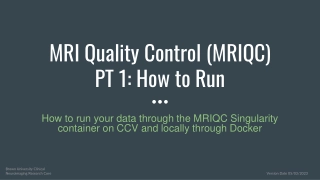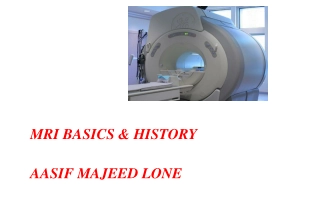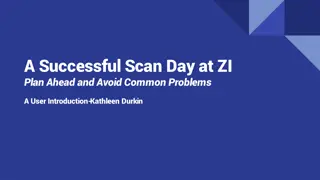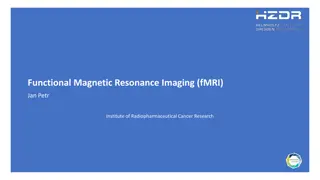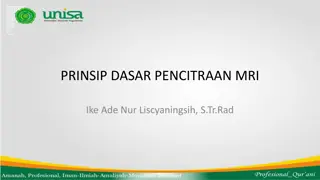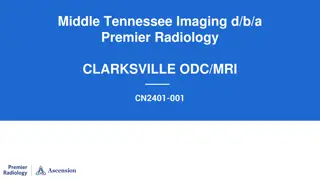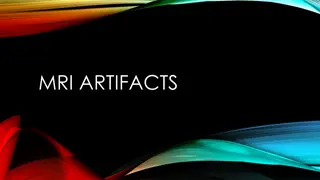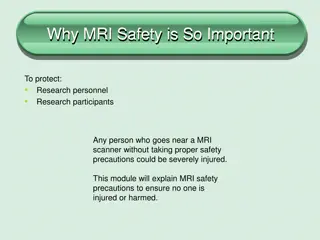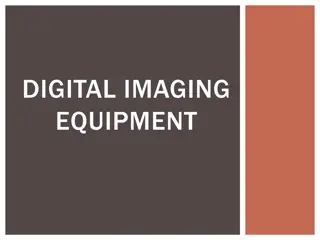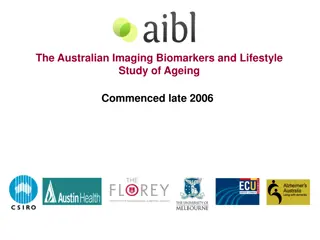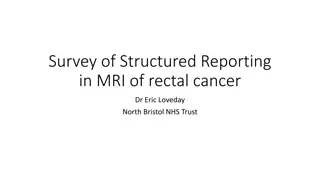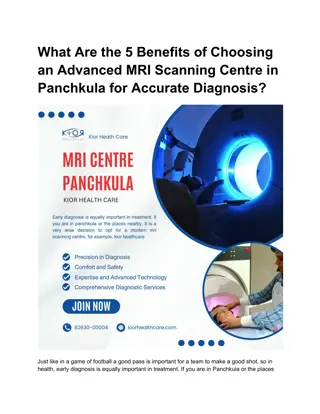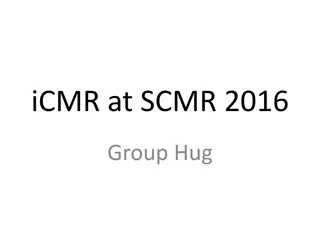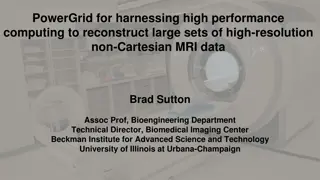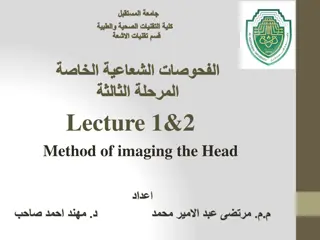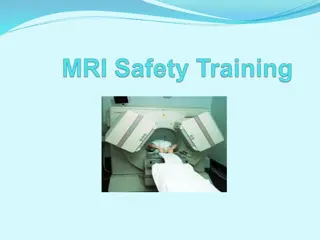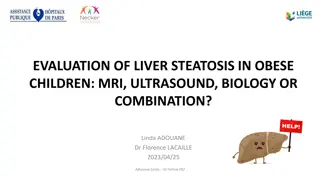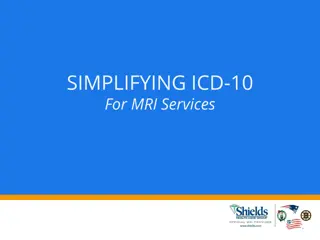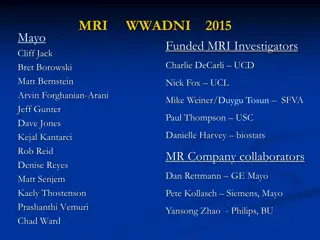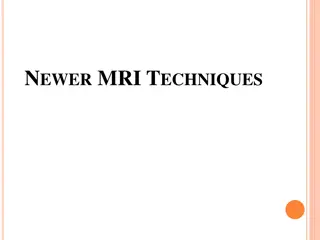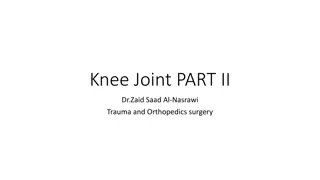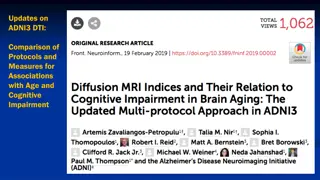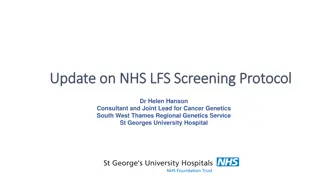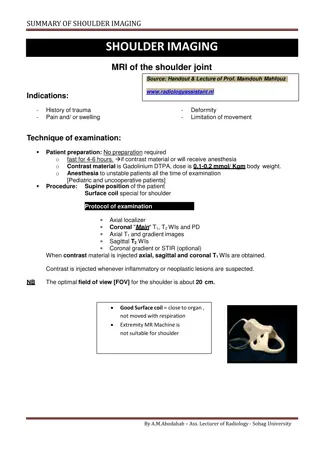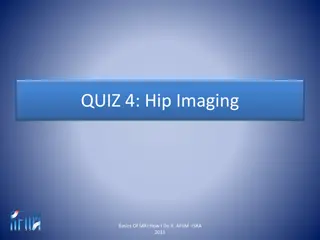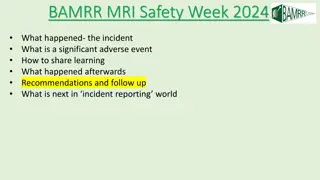MRIQC: Enhancing MRI Data Quality Assessment
MRIQC is a software tool for automatic quality assessment of MRI data, allowing comparisons across subjects and sites. It generates reports on Image Quality Metrics, identifying and standardizing quality procedures. Improves QA by overcoming visual assessment limitations, reducing time consumption,
0 views • 28 slides
Non Coronary Vascular Stents
Safe scanning of patients with non-coronary vascular stents (NCVS) in MRI settings in NHS Scotland. It covers key questions regarding the safety of patients with NCVS, including risks associated with MRI at different strengths, timing of MRI post-stent implantation, and the safety of various stent m
1 views • 9 slides
MRI BASICS & HISTORY AASIF MAJEED LONE
Magnetic Resonance Imaging (MRI) has revolutionized medical imaging, offering detailed views of the body without harmful radiation. This article delves into the historical development of MRI, highlighting key milestones such as the discoveries of the Rotating Magnetic Field by Nikola Tesla and the w
9 views • 49 slides
Radiology Imaging Modalities for Renal System Evaluation
Various radiology modalities such as Ultrasound, X-Ray, MRI, CT, and Nuclear Scans are used to assess the renal system. Each modality has its advantages and disadvantages, with Ultrasound and MRI being radiation-free options, and Nuclear Scans providing functional assessment. Understanding the key f
6 views • 24 slides
Successful Strategies for a Smooth MRI Scan Day at ZI
Plan ahead and avoid common problems for a successful MRI scan day at ZI with tips on study setup, participant preparation, scheduling, reservation time management, and packing essentials. Ensure a smooth process by having the right team in place and following key steps outlined in this comprehensiv
0 views • 18 slides
Comprehensive Overview of Brain Imaging Techniques and Anatomy
Explore the world of brain imaging with functional MRI, MRI techniques, brain anatomy, neuronal activation, and brain vasculature explained in detail, shedding light on brain regions and their functions.
10 views • 53 slides
Basic Principles of MRI Imaging
MRI, or Magnetic Resonance Imaging, is a high-tech diagnostic imaging tool that uses magnetic fields, specific radio frequencies, and computer systems to produce cross-sectional images of the body. The components of an MRI system include the main magnet, gradient coils, radiofrequency coils, and the
2 views • 49 slides
Sheffield Early Help Assessment Form Update and Integration with Extended Support Plan
Sheffield has introduced an updated Early Help Assessment form to streamline the assessment process within the Early Help System. This new form combines the Early Help Assessment with the Extended Support Plan, aligning various assessment tools and referral forms into one comprehensive document. The
5 views • 22 slides
Premier Radiology Mobile MRI Utilization Report
Premier Radiology, operating in Clarksville, ODC/MRICN2401-001, received 58 letters of support from various healthcare professionals, elected officials, and community members. They plan to open 18 diagnostic imaging centers, including a new facility in March 2024. The service area covers Montgomery
2 views • 20 slides
Enhancing Language Learning Through Peer Assessment
Explore the benefits of peer assessment as a valuable tool for language learning, comparing it with self-assessment. Discover the components and challenges of self-assessment, along with the potential of peer assessment to improve accuracy and promote self-regulation. Gain insights into what peer as
3 views • 29 slides
Overview of DSW End Point Assessment Team Leader Level 3
DSW End Point Assessment Team Leader Level 3 provides a clear understanding of the assessment process, ensuring individuals comprehend why and when it occurs, responsibilities involved, and how DSW supports them. It covers topics such as what End Point Assessment entails, assessment design and deliv
1 views • 18 slides
Understanding MRI Artifacts: Causes and Examples
MRI artifacts are signal misrepresentations that can be caused by various factors such as patient movement, magnetic field inhomogeneity, metallic objects, and under-sampling. Motion artifacts, magnetic susceptibility artifacts, and aliasing/wrap-around artifacts are common types of artifacts that c
2 views • 7 slides
Importance of MRI Safety Precautions: Protecting Personnel and Participants
MRI safety is crucial to prevent severe injuries when working with the powerful magnetic fields generated by MRI scanners. This article covers safety training steps, badge access requirements, characteristics of magnetic fields, and the dangers associated with approaching an MRI scanner without prop
0 views • 31 slides
Advanced Imaging Technologies in Healthcare
Explore the world of digital imaging equipment including computed tomography (CT) scanners and magnetic resonance imaging (MRI) machines. Discover how these technologies work, their uses in medical diagnosis, and important facts to consider. Learn about the risks associated with CT scans and the ben
0 views • 59 slides
Understanding Assessment in Medical Education
Exploring the concepts of assessment in medical education, including defining assessment, types of assessment, reliability, validity, and aligning assessment methods with intended learning outcomes. The importance of constructive alignment and the impact of assessment on learning outcomes are also d
1 views • 12 slides
Assessment Matters in Sociology: Enhancing Learning Through Evaluation
Explore the significance of assessment in sociology education, focusing on key questions to evaluate current assessment procedures, review individual course assessments, and develop strategies to enhance student learning outcomes. Delve into the centrality of assessment in the learning process, with
1 views • 15 slides
Australian Imaging Biomarkers and Lifestyle Study: Progress and Focus
The Australian Imaging Biomarkers and Lifestyle Study of Ageing (AIBL) commenced in late 2006, with a cohort size and follow-up progress detailed. The study includes assessments and biomarker imaging, such as MRI, amyloid PET, and tau PET scans, with ongoing review cycles and data additions. Current
0 views • 12 slides
Insights into Managing Assessment in the Classroom by Assessment Research Group
Explore the importance of standards and assessment in education through the lens of the Assessment Research Group. Gain valuable perspectives on curriculum delivery, understanding the assessment system, learner assumptions, task parameters, and more. Discover how language, structure, and agency play
2 views • 25 slides
Enhancing Understanding through Assessment in Educational Design Workshop
Learn and collaborate on assessment practices in education design at the "Understanding by Design Assessment Focus" workshop. The agenda includes sessions on summative and formative assessment, feedback, reporting, and more. Engage in activities like generating questions, finding destination partner
1 views • 76 slides
Institutional Assessment Planning Workshop Feedback and Insights
Feedback and insights from a recent institutional assessment planning workshop led by Dr. Mark Nicholas at FSU S. Warren Conference Center & Inn. Participants provided feedback on the usefulness of the content, presenter knowledge, ability to develop assessment plans, post-training assessment knowle
1 views • 9 slides
Insights into Structured Reporting Practices in Colorectal Cancer Imaging
A survey conducted by Dr. Eric Loveday at North Bristol NHS Trust revealed the current landscape of structured reporting in MRI and CT scans for rectal and colon cancer. Results indicate a positive outlook towards implementing national standards for structured radiology reporting, with an emphasis o
0 views • 7 slides
Understanding Higher Education Assessment: The Complete Guide
Higher education assessment involves a systematic process of collecting, reviewing, and utilizing information to improve student learning and development. This guide covers the assessment cycle, learning outcomes, the mission behind assessment in higher education, what assessment is and is not, reas
1 views • 36 slides
What Are the 5 Benefits of Choosing an Advanced MRI Scanning Centre in Panchkula for Accurate Diagnosis
early diagnosis is equally important in treatment. If you are in Panchkula or the places nearby, it is a very wise decision to opt for a modern MRI scanning centre, for example, Kior Healthcare.
1 views • 3 slides
MRI Assessment Findings for Colon and Rectal Cancer
Baseline MRI assessment findings for colon and rectal cancer staging include detailed descriptions of the primary tumor, its borders, extent, muscularis propria involvement, lymph nodes assessment, vascular deposits, circumferential resection margin, peritoneal deposits, pelvic sidewall lymph nodes
0 views • 7 slides
Cutting-Edge iCMR Workshop Highlights and Participation Call
Dive into the latest innovations in interventional MRI (iCMR) with a series of hands-on workshops, informative sessions, and valuable opportunities to engage with experts in the field. Explore topics such as MRI catheterization, real-time MRI tutorials, and configuring iCMR suites. Learn about NHLBI
0 views • 7 slides
Overview of Environmental Impact Assessment and Strategic Environmental Assessment Directives
Environmental Impact Assessment (EIA) and Strategic Environmental Assessment (SEA) play crucial roles in evaluating the impact of planned activities on the environment. This content delves into the concept, origins, development, and key elements of environmental assessment, discussing the legal fram
2 views • 35 slides
PowerGrid: Reconstructing High-Resolution Non-Cartesian MRI Data for Bioengineering Research
PowerGrid is a cutting-edge system developed by Brad Sutton, Assoc. Prof. at the University of Illinois, for harnessing high-performance computing to reconstruct large sets of high-resolution non-Cartesian MRI data. This technology addresses the need for improved image reconstruction packages in MRI
0 views • 10 slides
Institutional Assessment and Effectiveness Workshop Achievements at SUNY Oneonta
The Office of Institutional Assessment and Effectiveness at SUNY Oneonta has made significant progress in developing assessment protocols and processes, leading to a culture of assessment. This includes completing planning and assessment cycles, establishing objectives and procedures, and aligning u
1 views • 16 slides
Methods of Imaging the Brain: X-ray, CT Scan, and MRI
Different methods of imaging the brain, including X-ray, CT scan, and MRI, offer non-invasive ways to study brain structure and function. X-rays measure tissue density, CT scans provide detailed cross-sectional images, and MRI produces 3D anatomical images. MRI, in particular, has become a vital too
0 views • 37 slides
Understanding MRI Machine Safety and Considerations
MRI machines utilize powerful magnets and advanced technology for medical imaging. The magnets are superconducting, requiring ultra-cold temperatures for operation, and safety considerations include managing biological effects, area effects, and cryogenic gases. The magnetic fields used in MRI scans
0 views • 20 slides
Evaluation Methods for Liver Steatosis in Obese Children
This study examines the assessment of liver steatosis in obese children using MRI, ultrasound, and biology techniques, evaluating methods such as attenuation coefficient and proton density fat fraction. The aim is to develop noninvasive biomarkers and validate existing scores for predicting NAFLD. P
0 views • 22 slides
Simplifying ICD-10 for MRI Services Overview
Understanding the transition from ICD-9 to ICD-10 is crucial for MRI services. The shift involves more specific information and detailed documentation to improve patient care quality. ICD-10 codes require additional details such as location, severity, mechanism of injury, and history. The key lies n
0 views • 20 slides
Advanced MRI Protocols for Neuroimaging Studies
Cutting-edge MRI protocols, ADNI 3, aim to enhance brain imaging techniques for clinical trials, focusing on precise measurements, disease detection, and potential treatment evaluation by leveraging advanced imaging methods like ASL, dMRI, and TF-fMRI.
0 views • 20 slides
Understanding Magnetic Resonance Imaging (MRI)
Magnetic Resonance Imaging (MRI) is an imaging technique based on nuclear magnetic resonance principles. It was first developed in the 1970s by Paul Lauterbur and Peter Mansfield. MRI uses the interaction between protons in the body and magnetic fields to create detailed images. This technology has
0 views • 77 slides
Understanding the Menisci of the Knee Joint
Magnetic Resonance Imaging (MRI) is crucial in assessing knee joint internal derangements, including the menisci. These C-shaped structures play a vital role in providing stability, distributing weight-bearing strain, and facilitating joint movement. The medial and lateral menisci have distinct atta
0 views • 16 slides
Insights into DTI and Advanced MRI Measures for Cognitive Impairment
Comparison of DTI protocols and measures in 317 participants revealed strong associations with age and cognitive impairment. MD and TDF-FA emerged as best measures, with robust connections to age. NODDI in advanced MRI allows for differentiation of A-beta positive and negative groups, offering great
0 views • 6 slides
Update on NHS LFS Screening Protocol by Dr. Helen Hanson at St. George's University Hospital
Screening recommendations for individuals with Li-Fraumeni Syndrome (LFS) with a predisposition to multiple cancers are being updated following a UK Consensus Meeting in July 2018. The consensus group recommends specific tumour screening protocols for various age groups, including abdominal ultrasou
0 views • 16 slides
Comprehensive Guide to Shoulder MRI Imaging and Interpretation
Shoulder MRI imaging is valuable for assessing trauma, pain, swelling, deformity, and movement limitations. This detailed guide covers patient preparation, examination techniques, protocol, and interpretation of shoulder scans including assessment of tendons, ligaments, bursae, and bones.
0 views • 12 slides
Hip Imaging Basics: MRI Techniques and Sequences for Bilateral Examination
This content presents a quiz on hip imaging basics focusing on MRI techniques and sequences for bilateral examination. It covers topics such as appropriate positioning, the use of Propeller sequences, and the best choice of sequence for labral arthro-MR study. Images and questions related to hip ima
0 views • 15 slides
Insights from BAMRR MRI Safety Week 2024 Incident and Recommendations
The incident during BAMRR MRI Safety Week 2024 was more complex than initially thought, with numerous contributing factors identified. Immediate changes in practice were implemented, such as new procedures for general anesthesia, equipment checking, staff authorization, and physical safety measures.
0 views • 10 slides
